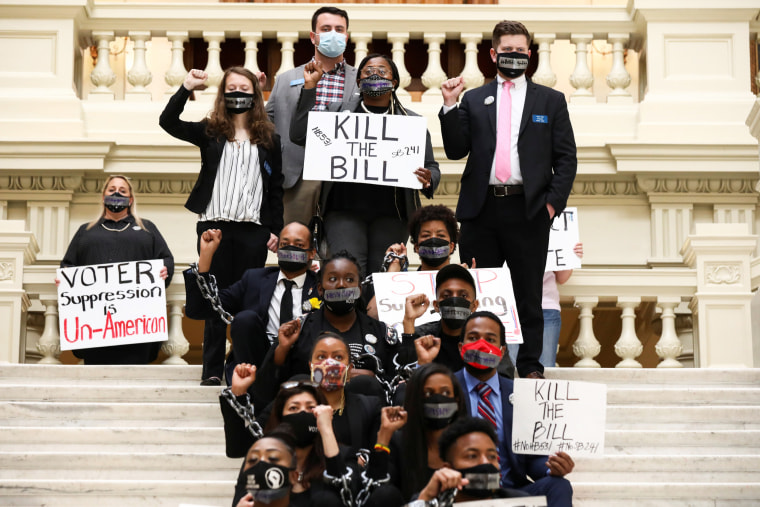CEOs for Delta Airlines and Coca-Cola came out in strong opposition to Georgia’s recently passed voting law on Wednesday, both calling the law "unacceptable."
On Wednesday morning, Delta CEO Ed Bastian said in a memo to employees that the law is “unacceptable and does not match Delta’s values.”
"Let me be crystal clear and unequivocal, this legislation is unacceptable," Coca-Cola CEO James Quincey said later that day on CNBC.
In the week since a sweeping package of election restrictions was signed into law by Republican Gov. Brian Kemp, activists have threatened to boycott Delta and other Atlanta-based companies, saying they didn't do enough to stop the law from being passed.
Delta’s statement,which the company shared with NBC News, is a forceful repudiation of the Georgia law — and similar efforts around the country.
“After having time to now fully understand all that is in the bill, coupled with discussions with leaders and employees in the Black community, it’s evident that the bill includes provisions that will make it harder for many underrepresented voters, particularly Black voters, to exercise their constitutional right to elect their representatives. That is wrong,” the memo reads.
Quincey said the company had opposed the bill from the start and had lobbied against it.
"Our position remains the same: This legislation is wrong, it needs to be remedied, and we will continue to advocate for it both in private and now, even more clearly in public," he said.
Dozens of Black business leaders publicly urged corporations to oppose voting restrictions in a public letter on Wednesday. The New York Times first reported the letter.
In an interview with NBC News, one of the leaders of the effort, Kenneth Chenault, said issuing statements isn't enough.
“We are saying that companies need to directly and publicly oppose this legislation. And they need to bring their resources and capabilities to influence the elected officials,” Chenault, former CEO of American Express, said Wednesday. “It’s not enough to issue a general statement and say, ‘We believe in fair elections.' The issue is, what do you say in Georgia? Florida? Indiana? You have to publicly oppose it and you have to bring your resources to bear to try to effectuate the right outcome.”
Merck CEO Kenneth Frazier, who spearheaded the effort with Chenault, said that it is important for these corporations to speak out now — lest Georgia's law become a "prototype" for others around the country. But he cautioned against activism focused solely on Georgia-based companies.
“While those companies are headquartered in Georgia, we all have an interest in whether people in Georgia can vote. We all do business in Georgia," he said.
Bastian suggests that Delta could get involved in future voting legislation fights, too.
“The entire rationale for this bill was based on a lie: that there was widespread voter fraud in Georgia in the 2020 elections," Bastian wrote. "This is simply not true. Unfortunately, that excuse is being used in states across the nation that are attempting to pass similar legislation to restrict voting rights. So there is much work ahead, and many more opportunities to have an impact."
Advocates began pressuring major Atlanta-based corporations well before the bill’s passage. Several companies issued statements re-emphasizing their support for free and fair elections and voting rights, but advocates argued those statements fell short of combating the proposed laws.
Both company's CEOs made it clear they lobbied state lawmakers over the bill.
Quincey was pressed on why he was only going public now, nearly a week after the bill became law.
"The reality is many things are improved and done and achieved in private without having to take a public stand. But in this case, it has not worked, clearly, so we’re being more forceful in our public position," he told CNBC.
Delta said they had helped to make the bill less suppressive.
"Since the bill’s inception, Delta joined other major Atlanta corporations to work closely with elected officials from both parties to try and remove some of the most egregious measures from the bill," Bastian's memo notes. "We had some success in eliminating the most suppressive tactics that some had proposed."
While it is unclear exactly what provisions of the law Delta opposed, earlier versions of the bill would have dramatically curbed weekend early voting, something the final version expanded.
Kemp pushed back on Delta's opposition in a statement shared with NBC News on Wednesday.
"Today's statement by Delta CEO Ed Bastian stands in stark contrast to our conversations with the company, ignores the content of the new law, and unfortunately continues to spread the same false attacks being repeated by partisan activists," he said, arguing that the bill expands access and bolsters election security.
"Mr. Bastian should compare voting laws in Georgia — which include no-excuse absentee balloting, online voter registration, 17 days of early voting with an additional two optional Sundays, and automatic voter registration when obtaining a driver’s license — with other states Delta Airlines operates in,” Kemp said.


